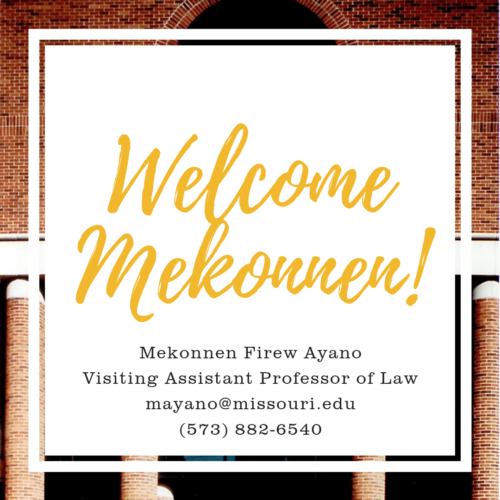
Mizzou Law Visiting Assistant Professor of Law Mekonnen Ayano took time to answer a few questions before the semester begins.
What does this position mean for you? This position means many things for me. First, it is a path to broaden my research and scholarship. I have done some work in the fields of property, natural resource, development and law and social change more generally in comparative and postcolonial settings. In my most recent work, I am looking at legal issues intersecting immigration and housing, combining immigration, informality, and transnational movement of persons and legal rules. Being at Mizzou Law, I am well positioned to explore and write about these topics in a thorough and sustained way.
Second, as I enjoy research and teaching law, this position will be a launchpad for me toward a more fulfilling intellectual life in the legal academy. At Harvard Law School I taught a course on law and development in emerging market economies. Here at Mizzou Law, I will be teaching immigration law, natural resources, and property. These are fields in which I have developed unique expertise over the last several years. I’m looking forward to further honing my teaching skills as I interact with and learn from colleagues and students at the school.
This position has also been an extraordinary opportunity to meet experts in various fields of law. Some of them are among the top names in the fields of my interest. Which means I get to work with them. Aside from the academic and professional life, I am enjoying being here in Columbia. There are so many enticing community activities across the town. Last weekend, I and a group of colleagues had a soccer watch party; we watched the US team final match at the Ragtag Cinema. I have a plan to involve in various community activities.
How will your department help students? Mizzou law prepares students primarily for a career in the legal profession. The legal profession requires knowledge of the legal rules, doctrines, and policies as well as the skills and techniques of legal reasoning, making legal arguments, decisions etc. Some of these require a rigorous theoretical understanding of the law. Others require experience in practical settings. I think I have something important to contribute in both areas, as a scholar and as a lawyer.
What does it mean for Mizzou Law? The legal profession has increasingly become a global practice. The world has always been connected at least since colonial times. But an increasingly intensifying transnational movement of goods, services, technology, and people is connecting disparate parts of the planet more than ever. Many lawyers now work on transnational issues whether they are in the private or public sector. Even those lawyers who are practicing in local settings face legal questions that have robust transnational dimensions. Local practices are no longer limited to domestic affairs. All this means that law students must understand the local and transnational aspects of law and legal practice to tackle challenging and complex problems facing the world today. Students of law today do well if they are trained in diverse legal settings, whether they plan to practice locally or elsewhere in the US, or somewhere across the world.
How does your background and experience help you in this role? I will bring insights and experiences that I have acquired over many years to my class. Practicing law as a judge in Ethiopia and as a counsel working for international development agencies, I have acquired rich experience connecting different legal cultures and cultural places. I worked for three years at the World Bank in Washington, DC, providing transactional and sectoral legal services for international development projects and programs. In Burundi and Kenya, I worked as a counsel for a regional economic block consisting of over twenty African countries. I gained theoretical insights and perspectives during my graduate studies and postdoctoral research. My first law degree was in Ethiopia. I had a master’s degree in international and comparative law from the American University in Cairo, and another master’s and a doctoral degree from Harvard Law School. These diverse experiences mean that I will share with my students helpful theoretical and practical legal materials. One of the courses I will be teaching is immigration law. This is one of the complex areas of the law involving domestic legal, political and social questions. Another course is natural resource law. Both of these courses primarily concern US laws and policies. But they are also profoundly transnational, linking different fields and places across. My experience in the fields will be valuable for students.
What do you want to accomplish in this position? I want to be a productive member of the faculty and the law school community. A good friend to my colleagues and students. Being productive means helping students understand and apply the rules and policies and have a rewarding learning experience. Sharing my insights and experience with colleagues. Contribute to the wider community of Columbia.
Why are you excited about this new role? I have met wonderful people here. I’m excited about my classes—to meet my students, share my thoughts and experience and learn from theirs. Also, as I come from a rural background in Ethiopia, I’m planning to travel and explore the surroundings of Columbia. I know the rural United States is totally different from rural Ethiopia, but Missouri is one of the agricultural states and I am looking forward to exploring and connecting with the social and natural environment outside the city of Columbia.
What does success in this new role look like? Progress in my research and writing is very important. But helping students gain useful experience in studying law and contributing to community life at the school and the city are also things I would look at to tell what my success should look like.